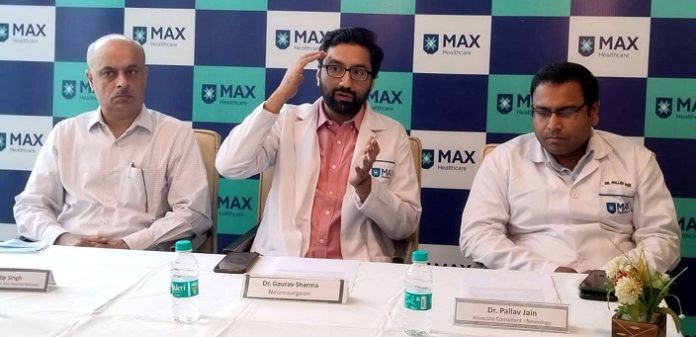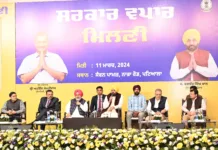Don’t ignore early symptoms of brain stroke: Expert
Kanwar Inder Singh/ royalpatiala.in
“One should not ignore early symptoms of brain stroke and rush for medical help as soon as possible. The symptoms may be sudden loss of sensations or weakness in the face, hands and feet especially in one part of the body, difficulty in walking, dizziness, lack of balance & sudden sharp headache,”
Addressing a press conference here on Friday on brain stroke awareness to mark World Stroke Day , Dr. Pallav Jain, neurologist at Max Hospital Bathinda said that stoke treatment aims to smooth and normalize blood circulation, so as to protect brain cells from damage.
Some medicines also try to open the blockage of nerves, but these medicines should be given within 4-5 hours of stroke which is also known as ‘golden period’, he maintained.

Although the exact cause of the rise in blood pressure in winter is yet to be ascertained, most experts believe that the veins shrink in winter and due to the thickening of the blood, it takes more effort to pump it for its circulation in the body, opined Dr. Pallav.
He further said that this increases blood pressure. In this season, you can reduce the risk of stroke by covering your body with woolen and warm clothes. Keep the windows and doors closed and put curtains, so that the heat remains in the room. The ideal room temperature should be 18 to 21 °C. People who have high blood pressure, their blood pressure rise to dangerous levels in the morning in winter. This increases the risk of brain stroke manifold, he asserted.
What is stroke
A stroke occurs when the blood supply to part of the brain is interrupted or reduced, preventing brain tissue from getting oxygen and nutrients. Brain cells begin to die in minutes.
Signs and symptoms of stroke include:
- Trouble speaking and understanding what others are saying. You may experience confusion, slur words or have difficulty understanding speech.
- Paralysis or numbness of the face, arm or leg. You may develop sudden numbness, weakness or paralysis in the face, arm or leg. This often affects just one side of the body. Try to raise both your arms over your head at the same time. If one arm begins to fall, you may be having a stroke. Also, one side of your mouth may droop when you try to smile.
- Problems seeing in one or both eyes. You may suddenly have blurred or blackened vision in one or both eyes, or you may see double.
- Headache. A sudden, severe headache, which may be accompanied by vomiting, dizziness or altered consciousness, may indicate that you’re having a stroke.
- Trouble walking. You may stumble or lose your balance. You may also have sudden dizziness or a loss of coordination.
October 29,2022













